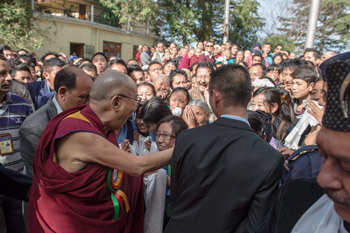Thekchen Chöling, Dharamsala, HP, India, 23 March 2016 - The Thekchen Chöling garden was decked out with flowers and brocade decorations in honour of the Men-Tsee-Khang's (Tibetan Medical & Astro Institute's) centenary celebrations. The Sikyong, with past and present members of the Kashag, and the Speaker and sitting members of the Tibetan Parliament in Exile were assembled on the platform below the Tsuglagkhang.
There was an air of anticipation among the Tibetans, young and old, who filled the yard, as they awaited the arrival of His Holiness the Dalai Lama. Then, drums rolled and a band of Tibetan students began to play as he appeared through the gate to his residence. Smiling and waving to members of the crowd he walked through the garden accompanied by members of the Himachal Pradesh Government and took his seat.
A short explanation was given of the threefold significance of the occasion. This year marks the centenary of the establishment of the Men-Tsee-Khang in Lhasa by the 13th Dalai Lama. Today marks the 55th year since His Holiness the Dalai Lama re-established the Men-Tsee-Khang in exile. In addition, it is 320 years since the 5th Dalai Lama established a medical college on Chagpori in Lhasa.
Everyone stood for the Tibetan National Anthem. Tea and sweet rice were served. Staff and students of the Men-Tsee-Khang sang a song specially composed for the occasion and the Director, Tashi Tsering, gave an address, first in English and then in Tibetan. He greeted His Holiness and all the dignitaries and guests. He reiterated that the Men-Tsee-Khang’s goal is to preserve the Tibetan art of healing, Sowa Rigpa, to contribute to the benefit of humanity. He thanked the staff and students of the Institute for their part in this. He recalled that when His Holiness the Dalai Lama re-established the Men-Tsee-Khang in 1961 and appointed the first physician, Dr Yeshi Dhonden, he remarked that it was a small start but that in time Tibetan Medicine would prove its worth.
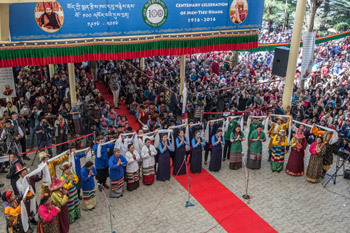
|
Staff and students of the Men-Tsee-Khang sang a song specially composed for the Centenary Celebrations of the Men-Tsee-Khang in Dharamsala, HP, India on March 23, 2016. Photo/Tenzin Choejor/OHHDL
|
The Director went on to say that in Tibet the medical college on Chagpori was destroyed and although the Lhasa Men-Tsee-Khang was spared many of its chief doctors were imprisoned. He cited the examples of Dr Tenzin Chödak and Dr Lobsang Wangyal, who eventually joined the Men-Tsee-Khang in exile after many years incarceration. He alluded to the co-operation that is developing between the Men-Tsee-Khang and the Transhimalayan states of Jammu & Kashmir, Himachal Pradesh, Arunachal Pradesh and Sikkim. He mentioned the conference convened at Samye by Emperor Trisong Detsen attended by physicians from Tibetan, Indian, Chinese and Yunani traditions. What was learned on that occasion was later set down in the Four Medical Tantras by Yuthok Yönten Gonpo the Younger (1126-1202). He concluded with a quotation from His Holiness:
“Humankind needs a healthy mind and a healthy body and we Tibetans can contribute to that need even though we are living as refugees.”
Shri Thakur Singh Bharmori, Minister for Forests in the Himachal Government was invited to speak. He praised His Holiness’s vision in re-establishing the Men-Tsee-Khang so soon after coming into exile, noting how important that had been for the status of the Tibetan medical tradition today. He recommended that traditional medical systems should consult and support each other. Noting that the Transhimalayan region is rich in medicinal herbs, he cautioned that we need to be judicious in using the bounty Mother Nature provides us.
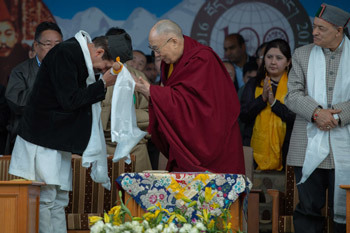
|
Himachal Pradesh Forestry Minister Shri Thakur Singh Bharmori looks on as His Holiness the Dalai Lama thanks Himachal Pradesh Minister for Ayush Shri Karan Singh with a souvenir at the Centenary Celebrations of the Men-Tsee-Khang in Dharamsala, HP, India on March 23, 2016. Photo/Tenzin Choejor/OHHDL
|
Shri Karan Singh, Minister for Ayush, told the crowd that he was pinching himself to make sure he was not dreaming, since he could not believe that he had the honour of sitting next to His Holiness. He said that as Minister for Ayush, he was very impressed by the Men-Tsee-Khang's work. Since Sowa Rigpa, the Tibetan art of healing, was recognised by the Government of India in 2010, he looked forward to helping promote it in India and abroad.
Shri Ravi Thakur, Lahaul & Spiti MLA, a long term friend of Tibetans and supporter of the Men-Tsee-Khang expressed his gratitude to His Holiness for his several visits to Lahaul & Spit and for the teachings he has given there, including the Kalachakra Empowerment. He was also profuse in his admiration of the Men-Tsee-Khang’s efforts and concluded, as his colleagues had before him, by wishing His Holiness a long and healthy life.
His Holiness presented souvenirs to each of the Indian politicians and Russian MP Irinchey Matkhanov, who, hailing from Buryatia, is a member of the State Duma Committee on Health Protection. He also showed appreciation to Dr Yeshi Dhonden for his many years’ dedicated service, as well as to several other physicians and pharmacists.
Invited to address the assembly, His Holiness began by saying he couldn’t remember the names of all the guests and dignitaries, but he greeted them all. He remarked:
“This has been one of the most difficult periods of Tibetan history, but we’ve worked hard and the re-establishment of the Men-Tsee-Khang was part of our efforts. We arrived as strangers, but many different organizations that care for refugees were kind to us. So, now, after more than 50 years in exile, Tibet is known to have its own language which is the medium for the preservation of our rich culture. This is sometimes described in terms of the five major and five minor sciences, which include Sanskrit grammar, medicine, Buddhist philosophy, logic and epistemology and arts and crafts.”
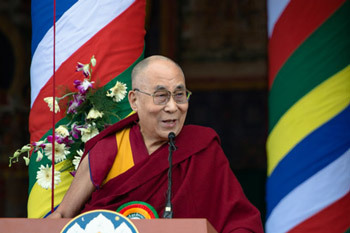
|
His Holiness the Dalai Lama speaking at the Centenary Celebrations of the Men-Tsee-Khang at the Thekchen Chöling courtyard in Dharamsala, HP, India on March 23, 2016. Photo/Tenzin Choejor/OHHDL
|
He stressed how important logic and epistemology were to Indian masters of the Sanskrit tradition. They employed them, as the Buddha advised, to test and evaluate his teachings. This enabled them to distinguish those teachings that could be accepted literally, because they accorded with reason and logic, and those that were subject to interpretation. He mentioned that the extensive literature on logic and epistemology by Dignaga and Dharmakirti is preserved in Tibetan and acknowledged the work of Chapa Chökyi Sengey (1109-69) and Sakya Pandita (1182-1251), author the ‘Treasury of Logic’ in assimilating it into Tibetan studies.
Regarding arts and crafts, His Holiness said they were not extensive but included the fashioning of statues of Buddhas, Bodhisattvas and Lamas, skills preserved locally at the Norbulingka Institute. He mentioned Khunnu Lama Rinpoche's telling him that arts and crafts could be regarded in either external or internal terms. The Buddhist practice of inner transformation would be part of the latter category. His Holiness extolled the Tibetan tradition of rigorous study, practice and engendering of experience as something quite amazing.
“From my own experience I’ve come to appreciate the value of the traditions we’ve kept alive. A comprehensive system of Buddhism spread throughout Tibet and yet the majority of Tibetans remained illiterate and uninformed about it. If we wish these traditions to survive now we have to engage them with our intellect. If we only have blind faith without understanding or employing logic and reason, Buddhism won’t last.
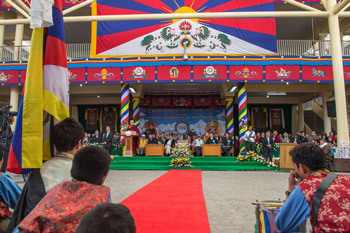
|
His Holiness the Dalai Lama speaking at the Centenary Celebrations of the Men-Tsee-Khang at the Thekchen Chöling courtyard in Dharamsala, HP, India on March 23, 2016. Photo/Tenzin Choejor/OHHDL
|
“No matter how long you say them, prayers alone won’t make much difference. I’m a dedicated student of Nagarjuna, but I don’t think praying to him is of much use. We need to study and understand. If we don’t the more than 300 volumes of the Kangyur and Tengyur won’t be of much use either. The Buddhas don’t wash away sins with water, nor do they remove sufferings with their hands. The way they help beings is by teaching what they themselves have realized. To purify our minds we have to overcome the disturbing emotions that obstruct them. This means that we should also study widely. If you’re a Gelugpa you should study the other traditions, Nyingma, Sakya and Kagyu too if you can.
“Regarding Sowa Rigpa, if a great conference could have been convened in the 8th century when facilities were so poor, today when we have facilities and opportunities we should be able to repeat it. Our tradition derives from Tibetan, Ayurveda, Chinese and Yunani systems. We should meet with practitioners of these traditions, discuss and exchange what we know. We shouldn’t rely only on the Four Tantras, but should also take other findings into account. It’s not a time to be complacent. We should extend our interest; find out what we can contribute and what we can learn. For urgent ailments allopathic treatment is often more suitable, but in the long term Tibetan medicine has great healing qualities.”
His Holiness acknowledged that the Men-Tsee-Khang has done a great deal to preserve Tibetan medical, astronomical and astrological traditions, but when he comes across chronically sick people in the settlements he wonders if something hasn’t been neglected.
“You may think things will be all right if you just carry on as you are, but there is also a need to listen to criticism and examine our shortcomings and find ways to resolve them. For example, there is an important role for taking preventive measures. Let’s see how we can improve. That’s all, thank you. Tashi Delek.”
And with that His Holiness stepped down from the platform and again smiling and greeting members of the audience as he went, he returned to his residence. Celebrations, including songs and dances and the serving of lunch, continued in the garden.
